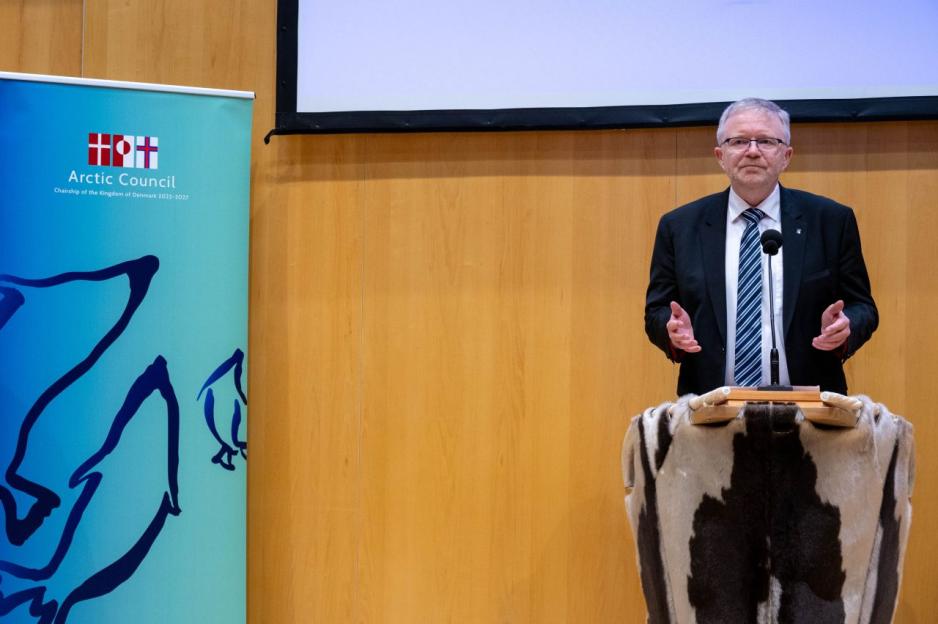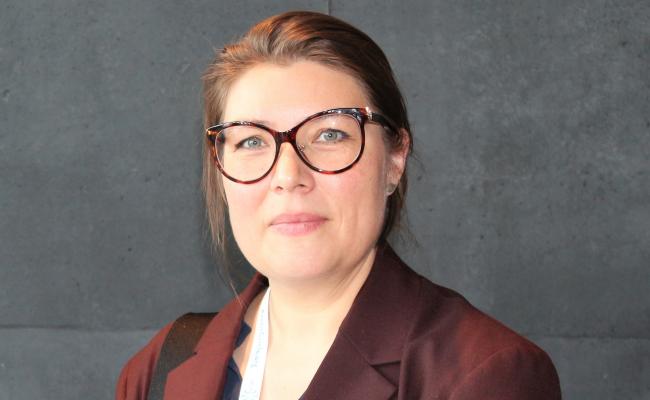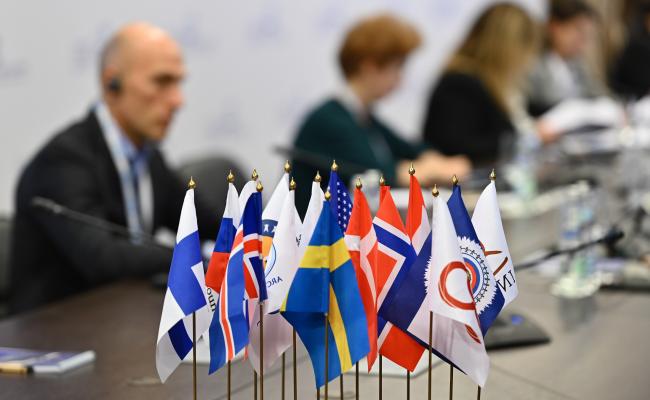Op-ed: ICC Welcomes Strong Emphasis on Indigenous Peoples in Arctic Council Chairship Programme

Kenneth Høegh, incoming Chair of the Arctic Council’s Senior Arctic Officials, during the Chairship presentation event in Nuuk, Greenland. (Photo: Jessica Cook / Arctic Council Secretariat)
The Inuit Circumpolar Council supports the strong and important aspirations of the incoming Chairship to “keep the Arctic Council vibrant and resilient, first and foremost for the Indigenous Peoples, and for the Arctic to remain a region of stability and constructive cooperation”.
This is an opinion piece written by an external contributor. All views expressed are the writer's own.
The Inuit Circumpolar Council (ICC) welcomes the incoming Arctic Council Chairship’s Programme.
The ICC supports the strong and important aspirations of the incoming Chairship to keep the Arctic Council vibrant and resilient, first and foremost for the Indigenous Peoples, and for the Arctic to remain a region of stability and constructive cooperation.
We can see much of ICC’s contributions reflected in the Chairship Programme. We wish to thank Naalakkersuisut and the governments of Denmark and Faroe Islands for ensuring a strong focus on Arctic Indigenous Peoples, and for having welcomed ICC’s input.
The Arctic Council is the preeminent body for Arctic cooperation. As a co-founder, ICC says it will continue to be instrumental in the development of the Arctic Council – a historic and unique consensus-based body for Arctic collaboration.
Unique governance structure
ICC strongly advocates for the continued strengthening of the Arctic Council.
ICC has worked hard – together with states and other Indigenous Peoples’ Organizations – to safeguard and strengthen the Arctic Council
The Arctic Council has a unique governance structure, with fourteen parties - eight states and six Indigenous Peoples’ Organizations - taking direct part in decision-making in the Arctic Council.
ICC has worked hard – together with states and other Indigenous Peoples’ Organizations – to safeguard and strengthen the Arctic Council, and we have taken full part in navigating the difficult waters of the recent years. We have great expectations and hope for the May 12th Arctic Council Meeting to bring together all eight Arctic states and six Permanent Participants in laying a good foundation for a continued strong cooperation.
Position paper on the Arctic Council
ICC issued a position paper on the Arctic Council in 2024, reiterating that the Arctic Council must evolve in a direction that further enhances the role of Inuit and other Indigenous Peoples and supports Indigenous Peoples’ inherent right to self-determination, affirming ICC’s position to ensure full and effective participation and meaningful engagement of Inuit as represented by ICC in the Arctic Council.
The first of five themes in the Chairship Programme is “Indigenous Peoples and communities of the Arctic.” ICC sees this as a clear recognition of Indigenous Peoples’ rights, status, and role in the Arctic, and in the Arctic Council.
The Chairship Programme’s emphasis on Indigenous Knowledge in marine governance, climate change, biodiversity, and sustainable economic development aligns with ICC’s declared goals.
We fully support the ambition of the incoming Chairship to strengthening the participation of Indigenous Peoples.
Important shift
The Chairship Programme lays the foundation for an important shift in the Arctic Council’s way of producing knowledge, as the incoming Chairship recognizes that Indigenous Knowledge and perspectives are essential to understanding and managing changes in the Arctic, and that “strong integration of Indigenous Knowledge alongside scientific insights in the work of the Arctic Council will be a priority.
Also read (the text continues)
The strong emphasis on Indigenous Knowledge is fully in line with ICC’s Arctic Council Position Paper, and our Circumpolar Inuit Protocols for Equitable and Ethical Engagement.
We look forward to partnering with the Chairship and all other states and Permanent Participants in ensuring a safe and welcoming environment for Indigenous Knowledge holders and experts in the Arctic Council’s Working Groups.
ICC has welcomed opportunities to provide informal feedback, while noting that no formal consultations with Permanent Participants on the Chairship Programme have taken place.
Virtual transition
The ICC will continue to call for formal consultations between the Arctic Council Chairship and Permanent Participants
ICC actively and formally engages in the ongoing deliberations on an outcome document for the May 12th Arctic Council Meeting.



